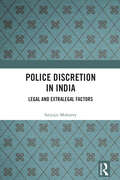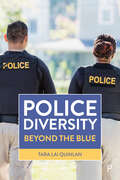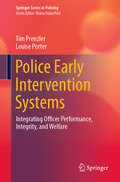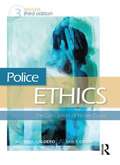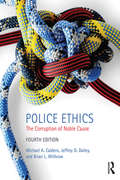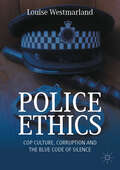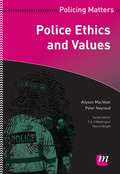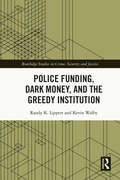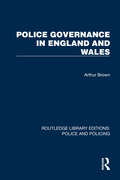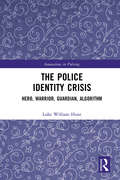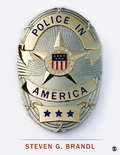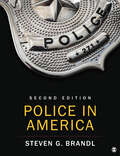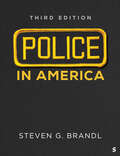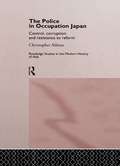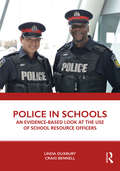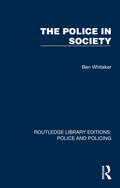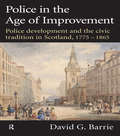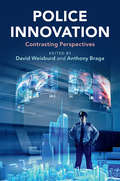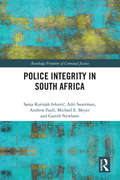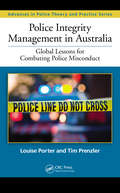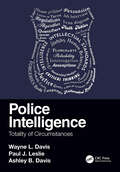- Table View
- List View
Police Discretion in India: Legal and Extralegal Factors
by Satyajit MohantyThis book is the first empirical study of police discretion in India. Going beyond anecdotal accounts, it addresses the issues and concerns of arrest discretion behaviour of police with analysis of available literature internationally, testing the validity in the context of police in India and explaining the gap that exists between the legislative intent and field law enforcement. It establishes how extralegal determinants like subculture, environment and situations influence arrest discretion as much as legal determinants such as statutes, rules, manuals and court rulings. It also provides vital explanations on the working of the police system in India.The volume will be of great interest to policymakers, police leaders, officers of judiciary, scholars and researchers of criminology and criminal justice, sociology and social anthropology and South Asian studies.
Police Diversity: Beyond the Blue
by Tara Lai QuinlanTensions between police and diverse communities in both the US and UK require innovation about ways to improve relations. While police diversity is often discussed as a potential solution, these discussions lack theoretical and empirical support. This volume presents an original discussion of race, gender, sexual orientation and class diversity and shows that police diversity can have meaningful impacts on the decision-making, outcomes and legitimacy of police forces. Drawing on theoretical and empirical research including interviews with diverse police leaders, this book examines how police diversity can help shift traditional policing cultures. It also considers obstacles to police reform, revealing how championing meaningful diversity can positively impact the lives of policed communities.
Police Early Intervention Systems: Integrating Officer Performance, Integrity, and Welfare (Springer Series in Policing)
by Tim Prenzler Louise PorterThis book documents the development of early intervention systems (EISs) internationally, and provides evidence for and against their effectiveness as a key tool to reduce police misconduct and improve the physical and psychological health of officers. Featuring practical illustrations to support textual examples, this volume offers valuable best practices for police departments and policing students.
Police Ethics: The Corruption of Noble Cause
by Michael A. Caldero John P. CrankThis book provides an examination of noble cause, how it emerges as a fundamental principle of police ethics and how it can provide the basis for corruption. The noble cause -- a commitment to "doing something about bad people" -- is a central "ends-based" police ethic that can be corrupted when officers violate the law on behalf of personally held moral values. This book is about the power that police use to do their work and how it can corrupt police at the individual and organizational levels. It provides students of policing with a realistic understanding of the kinds of problems they will confront in the practice of police work.
Police Ethics: The Corruption of Noble Cause
by Michael A. Caldero Jeffrey D. Dailey Brian L. WithrowPolice Ethics, Fourth Edition, provides an analysis of corruption in law enforcement organizations. The authors argue that the noble cause—a commitment to “doing something about bad people”—is a central “ends-based” police ethic. This fundamental principle of police ethics can paradoxically open the way to community polarization and increased violence, however, when officers violate the law on behalf of personally held moral values. This book is about the power that police use to do their work and how it can lead police to abuse their positions at the individual and organizational levels. It provides students of policing with a realistic understanding of the kinds of problems they will confront in the practice of police work. This timely new edition offers police administrators direction for developing agency-wide corruption prevention strategies, and a re-written chapter further expands our level of understanding of corruption by covering the Model of Circumstantial Corruptibility in detail. The fourth edition also discusses critical ethical issues relating to the relationship between police departments and minority communities, including Black Lives Matter and other activist groups. In the post-Ferguson environment, this is a crucial text for students, academicians, and law enforcement professionals alike.
Police Ethics: Cop Culture, Corruption and the Blue Code of Silence
by Louise Westmarland"This book is an important analysis of how police themselves define and respond to police corruption and wrongdoing. It offers special insights into this hard to research issue because it is based on using similar techniques of study on samples of police over time and in different jurisdictions, all linked by an autoethnographic account by Professor Westmarland — an internationally celebrated expert on the topic — narrating her engagement with the problems of police corruption and culture. This provides a revealing account of variations over time and between places. Clearly and engagingly written this is essential reading for students, scholars, practitioners and policy makers concerned about policing and its legitimacy." -Robert Reiner, Emeritus Professor of Criminology, LSE "This is a lively and fascinating book which places our understanding of policing ethics, integrity and police corruption within a long term timeline. The author traces how a particular research technique within policing studies - the use of 'scenario' based surveys of police officers to test officers' attitudes to the seriousness of a series of possible forms of police misconduct and their willingness to report those forms to others - has been utilised in policing research over a 50 plus year history. It begins with US-based pioneering policing research in the 1970s and takes us through the use of, and lessons learnt by, scenario-based research in later decades in the UK and internationally. This includes, by way of an autoethnography, the author's own critical research over the past 20 years, revisiting some earlier published research on the theme. This book is essential reading for those studying police integrity and corruption and the wider field of police cultures." - Professor Steve Savage, Emeritus Professor of Criminology, University of Portsmouth. This book outlines over 20 years of in-depth research on police culture and the blue code of silence which is said to protect and perpetuate police misconduct. It discusses the existing literature and draws upon first-hand research with many serving police officers and some police support staff. These studies not only provide evidence of the police code but are also useful for examining why and how to prevent its ill-effects. A recent (post 1950s) history of police cultural research which concentrates on ethics and integrity is provided with reflections on change and a discussion of the College of Policing&’s introduction of a code of ethics in 2014. It asks whether anything has changed but mainly analyses the individual studies and what the potential lessons learnt are from the various scand
Police Ethics and Values (Policing Matters Series)
by Peter Neyroud Allyson MacveanThis text provides an accessible, up to date and comprehensive introduction to police ethics and values for all those undertaking degrees and foundation degrees in policing and related subjects. The recent introduction of directives, legislation and Codes of Standards has demanded a more principled and professional approach to policing. This book therefore provides a clear understanding of police ethics and values and how these are understood in policy and applied in an operational setting. It discusses the range, importance and complexity of ethical issues faced by law enforcement practitioners and policy makers, introduces the key concepts of ethics, professionalism and policing, and relates these to key themes within policing.
Police Funding, Dark Money, and the Greedy Institution (Routledge Studies in Crime, Security and Justice)
by Kevin Walby Randy K. LippertPolice Funding, Dark Money, and the Greedy Institution is about a pervasive but little-studied phenomenon. Private funding of public police entails private entities sending resources to police through unconventional or hidden channels, sometimes for suspect reasons. The book argues police acquisition of this "dark money" befits the notion of a "greedy institution" that pursues resources beyond ample public funding and needs, and seeks ever more loyal members beyond its traditional boundaries to reproduce itself. The book focuses on private police foundations, corporate sponsorships, and paid detail arrangements primarily in North America, how these funding networks operate and are framed for audiences, and the forms and volumes of capital they generate. Based on interviews with police representatives, sponsors, funders, and foundation representatives as well as records from over 100 police departments, this book examines key issues in private funding of public police, including corporatization, accountability, corruption, and the rule of law. It documents and analyzes the troubling explosion of police foundations and sponsors and corporate paid detail brokers unknown to the public as a social and policy issue and a hidden response to the global police defunding movement. The book also considers potential policy responses and community safety alternatives in a more generous society. An accessible and compelling read, students and scholars in criminology, criminal justice, law, sociology, political science, anthropology, geography, as well as policymakers, will find this timely book revealing of a neglected, growing area of police practice spanning multiple themes and jurisdictions.
Police Governance in England and Wales (Routledge Library Editions: Police and Policing)
by Arthur BrownOriginally published in 1998, this handbook describes the statutes and cases that defined the governance, control and authority of the provincial police forces in England and Wales at the time. For many years the complexity and range of these legal authorities had caused misunderstandings and doubt when differing aspects of police activities had been questioned. To clarify the law a major step was taken in the enactment of the Police Act 1996. The consolidating Act brought together most of the existing statutory provisions regarding the governance of police forces. However, since about 1980, a number of other factors relevant to the powers and control of the police had emerged, most notably: Increased civil litigation had led to a number of cases defining the civil liability of the police; Increased use of judicial review procedures with consequent case decisions defining police powers in particular circumstances; Greater centralisation in police policies together with the Home Secretary’s control of finance and other matters; Increased police use of sophisticated technology for record keeping and surveillance purposes; The involvement of the security service in an anti-criminal role. The book (which includes illustrative charts) covers many complex legal issues. It has been written in a plain non-legalistic style. It is understandable to non-lawyers. However, for the benefit of practitioners, all statutory and case references are provided so that original materials can be consulted by those needing further information.
The Police Identity Crisis: Hero, Warrior, Guardian, Algorithm (Innovations in Policing)
by Luke William HuntThis book provides a comprehensive examination of the police role from within a broader philosophical context. Contending that the police are in the midst of an identity crisis that exacerbates unjustified law enforcement tactics, Luke William Hunt examines various major conceptions of the police—those seeing them as heroes, warriors, and guardians. The book looks at the police role considering the overarching societal goal of justice and seeks to present a synthetic theory that draws upon history, law, society, psychology, and philosophy. Each major conception of the police role is examined in light of how it affects the pursuit of justice, and how it may be contrary to seeking justice holistically and collectively. The book sets forth a conception of the police role that is consistent with the basic values of a constitutional democracy in the liberal tradition. Hunt’s intent is that clarifying the police role will likewise elucidate any constraints upon policing strategies, including algorithmic strategies such as predictive policing. This book is essential reading for thoughtful policing and legal scholars as well as those interested in political philosophy, political theory, psychology, and related areas. Now more than ever, the nature of the police role is a philosophical topic that is relevant not just to police officials and social scientists, but to everyone.
Police in America: Brandl, Police In America + Johnston, Careers In Law Enforcement
by Steven G. BrandlPolice in America provides students with a comprehensive and realistic introduction to modern policing in our society. Utilizing real-word examples grounded in evidence-based research, this easy-to-read, conversational text helps students think critically about the many misconceptions of police work and understand best practices in everyday policing. Respected scholar and author Steven G. Brandl draws from his experience in law enforcement to emphasize the positive aspects of policing without sugar-coating the controversies of police work. Brandl tackles important topics that center on one question: “What is good policing?” This includes discussions of discretion, police use of force, and tough ethical and moral dilemmas—giving students a deeper look into the complex issues of policing to help them think more broadly about its impact on society. Students will walk away from this text with a well-developed understanding of the complex role of police in our society, an appreciation of the challenges of policing, and an ability to differentiate fact from fiction relating to law enforcement.
Police in America: Brandl, Police In America + Johnston, Careers In Law Enforcement
by Steven G. BrandlPolice in America provides students with a comprehensive and realistic introduction to modern policing in our society. Utilizing real-word examples grounded in evidence-based research, this easy-to-read, conversational text helps students think critically about the many misconceptions of police work and understand best practices in everyday policing. Respected scholar and author Steven G. Brandl draws from his experience in law enforcement to emphasize the positive aspects of policing without sugar-coating the controversies of police work. Brandl tackles important topics that center on one question: “What is good policing?” This includes discussions of discretion, police use of force, and tough ethical and moral dilemmas—giving students a deeper look into the complex issues of policing to help them think more broadly about its impact on society. Students will walk away from this text with a well-developed understanding of the complex role of police in our society, an appreciation of the challenges of policing, and an ability to differentiate fact from fiction relating to law enforcement.
Police in America: Brandl, Police In America + Johnston, Careers In Law Enforcement
by Steven G. BrandlGrounded in evidence-based research, Police in America provides a comprehensive and realistic introduction to modern-day policing in the United States. This reader-friendly text helps students understand best practices in everyday policing and think critically about the many misconceptions of police work. Author Steven G. Brandl draws from his experience with law enforcement to emphasize the positive aspects of policing without ignoring its controversies.
Police in America: Brandl, Police In America + Johnston, Careers In Law Enforcement
by Steven G. BrandlGrounded in evidence-based research, Police in America provides a comprehensive and realistic introduction to modern-day policing in the United States. This reader-friendly text helps students understand best practices in everyday policing and think critically about the many misconceptions of police work. Author Steven G. Brandl draws from his experience with law enforcement to emphasize the positive aspects of policing without ignoring its controversies.
Police in America
by Steven G. BrandlGrounded in evidence-based research, Police in America, Third Edition provides a comprehensive and realistic introduction to modern-day policing in the United States. Written in a conversational tone and designed to be reader-friendly, this text helps students grasp best practices in everyday policing and encourages them to think critically about common misconceptions of police work. Author Steven G. Brandl draws from his experience with law enforcement to emphasize the positive aspects of policing while addressing its controversies and tackling topics centered on one pivotal question: "What is good policing?" Discussions of discretion, police use of force, and tough ethical and moral dilemmas offer students a deeper look into the complex issues of policing, prompting them to think more broadly about its impact on society.
Police in America
by Steven G. BrandlGrounded in evidence-based research, Police in America, Third Edition provides a comprehensive and realistic introduction to modern-day policing in the United States. Written in a conversational tone and designed to be reader-friendly, this text helps students grasp best practices in everyday policing and encourages them to think critically about common misconceptions of police work. Author Steven G. Brandl draws from his experience with law enforcement to emphasize the positive aspects of policing while addressing its controversies and tackling topics centered on one pivotal question: "What is good policing?" Discussions of discretion, police use of force, and tough ethical and moral dilemmas offer students a deeper look into the complex issues of policing, prompting them to think more broadly about its impact on society.
The Police In Occupation Japan: Control, Corruption and Resistance to Reform (Routledge Studies in the Modern History of Asia #Vol. 1)
by Christopher AldousMany Western commentators have expressed their admiration for the Japanese police system, tracing its origins to the American Occupation of Japan (1945-52).This study challenges the assumptions that underlie these accounts, focusing on the problems that attended the reform of the Japanese police during the Occupation. Drawing on a wide range of primary sources, Christopher Aldous explores the extent to which America failed in it's goal of 'democratizing' the Japanese police force, arguing that deeply-rooted tradition, the pivotal importance of the black market, and the US's decision to opt for an indirect Occupation produced resistance to reform. His study concludes with a consideration of the postwar legacy of the Occupation's police reform, and touches on a number of recent controversies, most notably the case of Aum Shinrikyo.
Police in Schools: An Evidence-based Look at the Use of School Resource Officers
by Linda Duxbury Craig BennellThis co-authored book critically reviews existing literature on school resource officer (SRO) programs and presents a thorough evaluation of an SRO program offered by Peel Regional Police in Ontario, Canada. The implementation of a SRO program is a controversial response to school violence and safety issues. While some call for an increased use of police in schools, others are pushing to remove police from schools, or at least to end their involvement in routine discipline. Though many SRO programs exist around the world, little systematic research has been conducted on the topic. The study reported in this book represents the largest and most comprehensive assessment of such programs to date. The research by Duxbury and Bennell indicates that SRO programs can provide real value for students, school staff, policing organizations, and society, but benefits rely on having programs that are well-designed, that the right officers are selected for SRO roles, and that the initiative has support from major stakeholders. Given the current conversations regarding the costs and benefits of having police officers in schools, there is a clear need to determine the value that investment in these types of proactive policing programs creates. The book provides researchers, SROs, police agencies, school boards, school administrators, teachers, parents, and students with information about: the activities that SROs are involved in, how SROs can collaborate with schools to create safe learning environments, and whether (and how) such programs benefit the police, schools, students, and society. Easy-to-digest charts facilitate understanding, and anonymized reflections from SROs, school staff, and students are presented throughout the book to provide context.
The Police in Society (Routledge Library Editions: Police and Policing)
by Ben WhitakerIn 1964 Ben Whitaker, who later defeated a former Home Secretary to become Hampstead’s first ever Labour MP and a Junior Minister, wrote The Police to try and reconcile (in his own words) ‘the very different impression police officers make when, as a barrister, one is defending from when one is prosecuting in court’. This book was widely praised as ‘The best and most impartial book that has yet been written on the police’ (Lord Gardiner); ‘The most truthful picture to date’ (Sunday Times); ‘Valuable’ (Observer); ‘Terse and telling’ (Sunday Telegraph); ‘Excellent, generous and sensible’ (Punch). After that time, the crime situation seriously deteriorated, as uncertainties about the exact nature of the police’s role in a democracy multiplied. Ben Whitaker spent five years interviewing policemen and others, and in this title, originally published in 1979, almost entirely rewrote his assessment and proposals for ameliorating the situation. Perceptively, critically yet impartially, he analyses the effectiveness, sociology, misconduct, and future of the police, and suggests radical reforms in their powers and relationship with the public. The Police in Society was timely and essential reading for anybody concerned with the human rights of individuals in a democratic society at the time and today can be read and enjoyed in its historical context.
Police in the Age of Improvement
by David BarrieThe study of police history in Scotland has largely been neglected. Little is known about the Scottish police's origins, development and character despite growing interest in the machinery of law enforcement in other parts of the United Kingdom. This book seeks to remedy this deficiency. Based on extensive archival research, its central aim is to provide an in-depth analysis of the economic, social, intellectual and political factors that shaped police reform, development and policy in Scottish burghs during the 'Age of Improvement'. The key issues addressed include: the workings of traditional forms of law enforcement and why these were increasingly deemed to be unsuitable by the late eighteenth and early nineteenth centuries; why, and in what ways, the pattern, nature and origins of police development in urban Scotland differed from elsewhere in Britain; in what ways the Scottish police model compared and contrasted with other British models; the impact of police reform on urban governance and the struggle between social groups for control of the local state; the concerns and priorities behind police policy. In addressing these questions, Police in the Age of Improvement moves beyond many of the 'problem-response' interpretations which have preoccupied many police historians, and locates reform within the wider contexts of urban improvement, municipal administration and Scottish Enlightenment thought. It will be essential reading for anyone interested in the history of policing, urban management and social change in the late eighteenth and nineteenth centuries.
Police in the Hallways: Discipline in an Urban High School
by Kathleen NolanAs zero-tolerance discipline policies have been instituted at high schools across the country, police officers are employed with increasing frequency to enforce behavior codes and maintain order, primarily at poorly performing, racially segregated urban schools. Actions that may once have sent students to the detention hall or resulted in their suspension may now introduce them to the criminal justice system. In Police in the Hallways, Kathleen Nolan explores the impact of policing and punitive disciplinary policies on the students and their educational experience. Through in-depth interviews with and observations of students, teachers, administrators, and police officers, Nolan offers a rich and nuanced account of daily life at a Bronx high school where police patrol the hallways and security and discipline fall under the jurisdiction of the NYPD. She documents how, as law enforcement officials initiate confrontations with students, small infractions often escalate into &“police matters&” that can lead to summonses to criminal court, arrest, and confinement in juvenile detention centers. Nolan follows students from the classroom and the cafeteria to the detention hall, the dean&’s office, and the criminal court system, clarifying the increasingly intimate relations between the school and the criminal justice system. Placing this trend within the context of recent social and economic changes, as well as developments within criminal justice and urban school reform, she shows how this police presence has created a culture of control in which penal management overshadows educational innovation. Police in the Hallways also examines the prevalent forms of oppositional behavior through which students express their frustrations and their deep sense of exclusion. With compassion and clear-eyed analysis, Nolan sounds a warning about this alarming convergence of prison and school cultures and the negative impact that it has on the real lives of low-income students of color—and, in turn, on us all.
Police Innovation: Contrasting Perspectives (Cambridge Studies In Criminology Ser.)
by David Weisburd Anthony A. BragaOver the last forty years, policing has gone through a period of significant change and innovation. The emergence of new strategies has also raised issues about effectiveness and efficiency in policing, and many of these proactive strategies have become controversial as citizens have asked whether they are also fair and unbiased. Updated and expanded for the second edition, this volume brings together leading police scholars to examine these key innovations in policing. Including advocates and critics of each innovation, this comprehensive book assesses the impacts of police innovation on crime and public safety, the extent of implementation of these new approaches in police agencies, the dilemmas these approaches have created for police management, and their impacts on communities.
Police Integrity in South Africa (Routledge Frontiers of Criminal Justice)
by Sanja Kutnjak Ivkovich Adri SauermanPolicing in South Africa has gained notoriety through its extensive history of oppressive law enforcement. In 1994, as the country’s apartheid system was replaced with a democratic order, the new government faced the significant challenge of transforming the South African police force into a democratic police agency—the South African Police Service (SAPS)—that would provide unbiased policing to all the country’s people. More than two decades since the initiation of the reforms, it appears that the SAPS has rapidly developed a reputation as a police agency beset by challenges to its integrity. This book offers a unique perspective by providing in-depth analyses of police integrity in South Africa. It is a case study that systematically and empirically explores the contours of police integrity in a young democracy. Using the organizational theory of police integrity, the book analyzes the complex set of historical, legal, political, social, and economic circumstances shaping police integrity. A discussion of the theoretical framework is accompanied by the results of a nationwide survey of nearly 900 SAPS officers, probing their familiarity with official rules, their expectations of discipline within the SAPS, and their willingness to report misconduct. The book also examines the influence of the respondents’ race, gender, and supervisory status on police integrity. Written in a clear and direct style, this book will appeal to students and scholars of criminology, policing, sociology, political science, as well as to police administrators interested in expanding their knowledge about police integrity and enhancing it in their organizations.
Police Integrity Management in Australia: Global Lessons for Combating Police Misconduct (Advances In Police Theory And Practice Ser.)
by Louise Porter Tim PrenzlerIn the past two decades, Australia has been the site of major police misconduct scandals and inquiries, leading to reform initiatives at the cutting edge of police integrity management practices. Presenting interviews with key informants and an analysis of key documents, Police Integrity Management in Australia: Global Lessons for Combating Police
Police Intelligence: Totality of Circumstances
by Wayne L. Davis Paul J. Leslie Ashley B. DavisPolice Intelligence: Totality of Circumstances is an essential resource and is designed for any individual who may encounter the field of criminal justice, whether the person is a police chief who oversees the department’s standard operating procedures, a police officer who enforces the law, a civilian who is expected to follow the law, a lawyer who may challenge an action in court, or a judge who will interpret the law. This book, in part, applies math and logic to laws and policies to objectively assess them. Laws and policies are written as English logical statements. English logical statements can be converted into mathematical logical statements, which can be objectively assessed via Boolean algebra. Specifically, truth tables, Venn diagrams, flowcharts, logic gates, and logic circuits can all be used to assess laws, policies, and proper police actions. For example, mathematically it is not a glass, blue, marble means almost the exact opposite of it is not glass, not blue, and not marble. In addition, one must consider existential and universal quantifiers, conditional statements, and subsets to correctly interpret laws and policies. Thus, it is important for individuals to understand how to mathematically assess English logical statements (e.g., the law) because if they do not, opponents in court may do it for them. This book is important because collecting and understanding information and effectively communicating are vital skills in law enforcement. It discusses different reference points for assessing good behavior, different lenses of truth, limitations of information, and assumptions. Furthermore, it examines a variety of ways to collect and assess information, which include interrogation techniques, interviewing techniques, an interrogatory and a deposition, ciphering and deciphering messages, body language, handwriting analysis, job interview questions, and crime scene search patterns. The chapters present a methodological reasoning process that is sorely lacking among police agencies— and one that is essential for developing critical thinking skills and carrying out orders within legal confines. Police Intelligence: Totality of Circumstances is an indispensable resource for helping students and officers to collect and assess information. Whether it is verbal or nonverbal information, ciphered messages, or using different bases for numeric communication, individuals in criminal justice should learn to think outside the box to collect and understand available information.
